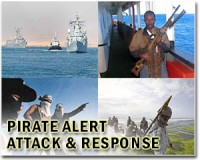| . |  |
. |
Northwood Headquarters, England (AFP) April 5, 2010 The British commander heading the European Union's naval task force is squaring up to a new wave of increasingly young Somali pirates, as the hijacking season returns. Rear Admiral Peter Hudson is trying to combat the gangs whose high seas piracy threatens both international trade and the survival of millions in their homeland who depend on food aid. The monsoon is over and the pirates are back. Prowling the Indian Ocean and the strategically vital Gulf of Aden shipping route, they racked up nine hijackings and 17 unsuccessful attacks in March. At the tight-security Northwood Headquarters complex, razor-wired off from the leafy suburbs of northwest of London, Hudson and his 120-strong team drawn from 16 countries are trying to stay ahead of the game. "We need to be adaptive, agile and try and be a bit more proactive than perhaps we were 12 months ago," he tells AFP in his spartan bunker office, which boasts an EU flag and maps of the seas pinned to the walls. "They are fearless individuals. They are still prepared to take this risk and increasingly they are young chaps -- early twenties, late teens, occasionally as young as 14 or 15. "We must use our aircraft intelligently, position our ships where we can see it is likely that pirates operate and try and foreclose the pirates' ability to get round our tactics -- and they're pretty adaptive characters themselves." Recent moves include the pirates swarming in clusters and the EU naval force trying to catch them before they reach the high seas. "The pirates can get out, despite our best efforts. The pirates can get lucky. So we need to try and keep on top of that," Hudson said. In March, EU Navfor collared 18 pirate gangs, destroyed 22 skiffs and apprehended some 131 pirates for prosecution. But there are eight vessels and 157 hostages now in the hands of Somali pirates. Operating from the 1,000-mile (1,600-kilometre) long Somali coast, gangs of pirates are sailing up to 1,000 miles out to sea, with a mother ship towing tiny attack skiffs. They risk their lives in the hunt for ships, cargo, oil, crew and the ransom fortunes they can command. "Somalia is still pretty broken. Life opportunities are limited in that area so the allure of large ransoms from large ships is still very high," Hudson said. "Some ships pay or attract ransoms of four, five, six million dollars. "So in terms of appetite, it's still very much there." Around 20 percent of global trade passes through the narrow Gulf of Aden, where EU Navfor's Operation Atalanta has been quelling Somali piracy. However, the gangs are steadily switching their attention to the Indian Ocean, seizing larger Yemeni, Pakistani or Indian cargo dhows and using them as a hub to launch attacks much further off the Somali coast. Hudson warned that this year they could strike across a wider sector of the Indian Ocean. "You squeeze the balloon, as we've done in the Gulf of Aden, they're now popping up in the southern Somali basin," he said. The captured dhows "allow them to get off the coast at 1,000 miles and sit there for a long period of time. "Do we think they've got to their limit -- that's as far as they go? I wouldn't be so naive as to say yes." Operation Atalanta's main task is to escort merchant vessels carrying World Food Programme (WFP) humanitarian aid and to protect vulnerable ships in the Gulf of Aden and Indian Ocean. Hudson is happy to have his progress measured against the force's mandate. No WFP ships have been hijacked since escorts began in December 2008. Around 60 transits have brought more than 300,000 tonnes of food aid to Somalia. The commanders at Northwood have detailed aerial images of pirate camps on the Somali coast, showing their skiffs, attack ladders, fuel drums and expensive vehicles. However, they cannot simply destroy the camps -- their mandate runs out at the water's edge. "In the long run, the solution to this is not chasing around, in half-billion dollar warships, plastic skiffs in the middle of the Indian Ocean. That's not going to stop piracy," Hudson said. "Piracy's going to be stopped by sorting our the mess that is Somalia."
Share This Article With Planet Earth
Related Links 21st Century Pirates
 US warship 'sinks pirate mother ship' off Seychelles
US warship 'sinks pirate mother ship' off SeychellesManama (AFP) April 2, 2010 A US warship intercepted suspected Somali pirates and sunk their "mother ship" after they attacked an oil tanker off the Seychelles, the US navy's Fifth Fleet said on Friday. It said the Sierra Leone-flagged tanker MV Evita on Thursday "came under attack 500 kilometres (110 miles) northwest of the Seychelles by three suspected pirate skiffs." "During the attack, the pirates fired rifles ... read more |
|
| The content herein, unless otherwise known to be public domain, are Copyright 1995-2010 - SpaceDaily. AFP and UPI Wire Stories are copyright Agence France-Presse and United Press International. ESA Portal Reports are copyright European Space Agency. All NASA sourced material is public domain. Additional copyrights may apply in whole or part to other bona fide parties. Advertising does not imply endorsement,agreement or approval of any opinions, statements or information provided by SpaceDaily on any Web page published or hosted by SpaceDaily. Privacy Statement |